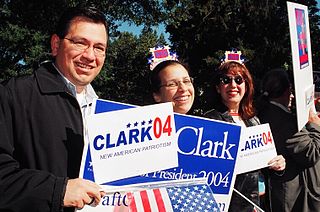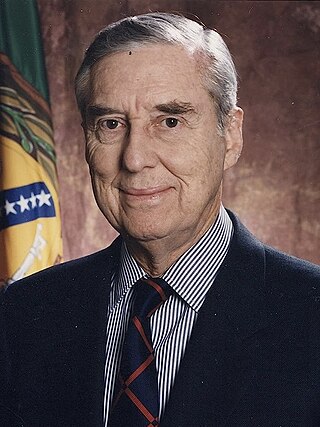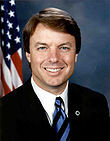
The 1988 United States presidential election was the 51st quadrennial presidential election held on Tuesday, November 8, 1988. Incumbent Republican Vice President George H. W. Bush defeated the Democratic Massachusetts Governor Michael Dukakis.

Richard Andrew Gephardt is an American attorney, lobbyist, and politician who represented Missouri's 3rd congressional district in the United States House of Representatives from 1977 to 2005. A member of the Democratic Party, he was House majority leader from 1989 to 1995 and minority leader from 1995 to 2003. He ran unsuccessfully for the Democratic nomination for President of the United States in 1988 and 2004. Gephardt was mentioned as a possible vice presidential nominee in 1988, 1992, 2000, 2004, and 2008.

From January 14 to June 8, 2004, voters of the Democratic Party chose its nominee for president in the 2004 United States presidential election.

The 2004 Iowa Democratic presidential caucuses were an election held on January 19 as part of the United States presidential primary. They were the first major test of some of the leading contenders for the Democratic Party's nomination as its candidate for the 2004 United States presidential election.

The 2004 presidential campaign of John Kerry, the longtime U.S. senator from Massachusetts, began when he formed an exploratory committee on December 1, 2002. On September 2, 2003, he formally announced his candidacy for the Democratic nomination. After beating John Edwards, Howard Dean, Wesley Clark, and other candidates in the primaries, he became the Democratic nominee, challenging Republican incumbent George W. Bush in the general election. Kerry selected Edwards as his running mate.
The 2004 Democratic National Convention featured a variety of speakers, ranging from former presidents to rising newcomers.

The 2004 United States presidential election in South Carolina took place on November 2, 2004, as part of the 2004 United States presidential election which took place throughout all 50 states and D.C. Voters chose eight representatives, or electors to the Electoral College, who voted for president and vice president.

This article lists potential candidates for the Republican nomination for Vice President of the United States in the 2008 election. On March 4, 2008, Senator John McCain of Arizona won the 2008 Republican nomination for President of the United States, and became the presumptive nominee.

From January 24 to June 6, 2000, voters of the Democratic Party chose its nominee for president in the 2000 United States presidential election. Incumbent Vice President Al Gore was selected as the nominee through a series of primary elections and caucuses culminating in the 2000 Democratic National Convention held from August 14 to 17, 2000, in Los Angeles, California, but he went on to lose the Electoral College in the general election against Governor George W. Bush held on November 7 of that year, despite winning the popular vote by 0.5%.

The 2004 presidential campaign of Dick Gephardt, former House Minority Leader and member of the U.S. House of Representatives from Missouri, began on January 5, 2003 with the filing of papers with the Federal Election Commission that established an exploratory committee. He formally announced his entry into the race for the Democratic nomination on February 19, 2003 in St. Louis, Missouri. The day after the Iowa caucuses, Gephardt dropped out of the race on January 20, 2004.

The 2004 Oklahoma Democratic presidential primary, part of the process of selecting that party's nominee for President of the United States, took place on February 3, one of the seven nominating contests of 2004's "Mini-Tuesday". The primary election chose 40 pledged delegates to represent Oklahoma at the 2004 Democratic National Convention. The remainder of Oklahoma's 47 delegates consisted of unpledged superdelegates not bound by the results of the primary. The election was a closed primary, meaning that only registered Democrats could vote in this election. Wesley Clark won the primary by a razor-thin margin over John Edwards.

The 2004 California Democratic presidential primary was held on March 2, 2004, the same day as the Republican primary. Senator John Kerry overwhelmingly won the primary over rivals Senator John Edwards, Congressman Dennis Kucinich, and Reverend Al Sharpton. The primary was open to both registered Democrats and unaffiliated voters. 440 delegates were at stake, with 370 tied to the March primary.

The 2004 presidential campaign of Wesley Clark, a retired U.S. Army general who served as Supreme Allied Commander Europe (SACE) from 1997 to 2000, officially began on September 17, 2003. A movement to draft Clark for the Democratic nomination began in April 2003, and was led by activists who felt Clark's military service and criticism of the War in Iraq made him a strong candidate. Prior to announcing his campaign, Clark was not known to have publicly identified with either party.

This article lists those who were potential candidates for the Democratic nomination for Vice President of the United States in the 2000 election. Incumbent Vice President Al Gore won the 2000 Democratic nomination for President of the United States, and chose Connecticut Senator Joseph Lieberman as his running mate on August 7, 2000. Lieberman, a centrist two-term Democratic senator, was chosen for being "tough on defense" and foreign policy issues. Lieberman was the first Jewish nominee chosen for a national ticket. The choice of Lieberman was announced shortly before the 2000 Democratic National Convention. Former Secretary of State Warren Christopher led the vetting process. The Gore–Lieberman ticket ultimately lost to the Bush–Cheney ticket. Coincidental to the presidential election, Lieberman was re-elected to a third term as senator from Connecticut.

This article lists those who were potential candidates for the Democratic nomination for Vice President of the United States in the 1992 election. On June 2, 1992, Arkansas Governor Bill Clinton won the 1992 Democratic nomination for President of the United States, and became the presumptive nominee. On July 9, 1992, Tennessee Senator Albert Gore Jr. was chosen as his running mate.

This article lists potential candidates for the Democratic nomination for Vice President of the United States in the 2016 election. Former Secretary of State Hillary Clinton, the 2016 Democratic nominee for President of the United States, chose Senator Tim Kaine of Virginia as her running mate. The formal nomination took place at the 2016 Democratic National Convention. The Clinton–Kaine ticket lost the 2016 presidential election to the Republican Trump–Pence ticket, and Kaine returned to the Senate following the campaign.

This article lists those who were potential candidates for the Democratic nomination for Vice President of the United States in the 1988 election. Massachusetts Governor Michael Dukakis won the 1988 Democratic nomination for President of the United States, and chose Texas Senator Lloyd Bentsen as his running mate. Dukakis chose Bentsen in order to appeal to Southerners and in hopes of carrying Bentsen's home state of Texas. The strategy failed, as the Dukakis-Bentsen ticket went on to lose Texas and all other states in the South except West Virginia. The choice of Bentsen caused some backlash from Jesse Jackson, who had wanted to be chosen as the vice presidential nominee, and progressives such as Ralph Nader. Paul Brountas, a longtime Dukakis aide, led the search for Dukakis's running mate. The Dukakis–Bentsen ticket would lose to the Bush–Quayle ticket in the general election. Bentsen simultaneously ran for reelection as Senator, and easily won, despite the Dukakis-Bentsen ticket's double-digit loss in Texas.

This article lists those who were potential candidates for the Democratic nomination for vice president of the United States in the 1984 election. Former Vice President Walter Mondale won the 1984 Democratic nomination for president of the United States, and chose New York Representative Geraldine Ferraro as his running mate. Ferraro was the first woman to be a part of a national ticket for a major party. Mondale chose Ferraro in hopes of energizing the base and winning the votes of women, but also because he viewed her as a solid legislator who had won the approval of Speaker Tip O'Neill. The Mondale–Ferraro ticket ultimately lost to the Reagan–Bush ticket. This is the last time the Democratic vice presidential nominee was not the incumbent vice president or a senator, and, not counting the times when the incumbent president was running for re-election, the last time the Democratic vice presidential nominee was not a senator.
This is a list of endorsements for declared candidates in the Democratic primaries for the 2004 United States presidential election.




















































